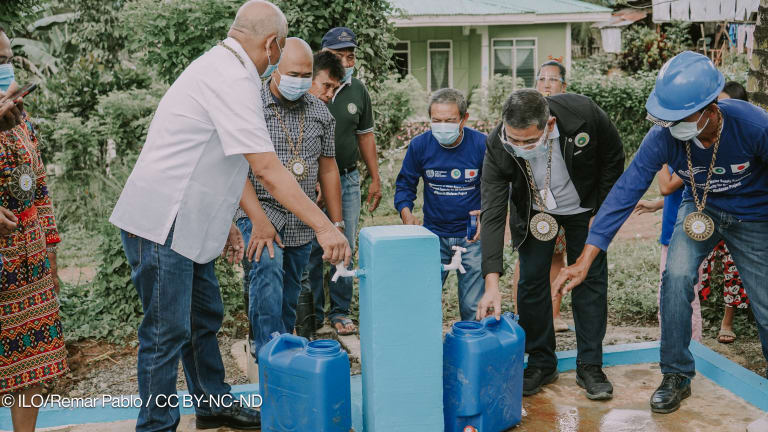Opinion: Japan is a major aid player. Here are 3 ways it can remain so
Japan needs to keep front of mind that official development assistance should be provided to reach those who are truly in need.
Japan’s Development Cooperation Charter will be revised in the first half of this year. This document will serve as a guideline for the government of Japan, the Japan International Cooperation Agency, as well as us, Japanese NGOs, and Japanese citizens to assist in low- and middle-income countries. Although the government's overall official development assistance, or ODA, budget has been reduced to about half of its 1997 peak, the total Japanese ODA budget for 2021 is the third-largest after the U.S. and Germany. The development cooperation charter’s revision is strongly imbued with the idea that “ODA is an important tool for [Japan's] national interest.” While the recommendations of the advisory panel convened by the government to revise the ODA guidelines noted that the ODA budget should be doubled over the next decade, they also advocated adherence to the non-military principle of avoiding the use of ODA for military purposes. For context: Japan aims to double defense spending to 2% of gross domestic product over the next five years, in a departure from its post-World War II commitment to keep spending at 1% of GDP. Further, the Ministry of Foreign Affairs’ 756 billion yen (about $5.8 billion) annual budget for financial year 2023 includes 2 billion yen to help other countries strengthen their military capabilities. This would include the provision of equipment and materials to other countries’ armed forces. This is linked to the Cabinet approving three defense-related documents last year. To date, defense expenditures have been requested and appropriated from the Ministry of Defense budget. This 2 billion yen is problematic in the aid context given its appropriation from the Ministry of Foreign Affairs, or MoFA, budget. If further exceptions like this are made, it is quite possible that more money originally intended for diplomacy will go to defense-related activities. Japan remains a large international player in the ODA field, and I would like Japan to go back to considering the original objective of ODA: To contribute to economic and social development in LMICs. Here are my three requests as the revision of Japan’s Development Cooperation Charter is underway. 1. Increase the ODA budget itself The United Nations has a target for countries to spend 0.7% of their gross national income on ODA. In 2021, Japan's ODA ratio was 0.34%, a far step from Germany's 0.74%, and France's 0.52%. The United Kingdom, which had maintained a 0.7% of GNI ratio since 2013, shocked the world when it lowered its ratio in 2021 to 0.5% due to financial difficulties, yet Japan's figure is still much lower than that. As emphasized in the recommendations of the ODA advisory panel, we would like to see the new Development Cooperation Charter set a clear numerical target of "achieving a GNI ratio of 0.7% in the next 10 years," as well as an interim target and other concrete steps to ensure that this goal can be achieved. 2. Review ODA financing methods Although its initial budget for FY 2023 exceeded 1 trillion yen, MoFA’s budget is limited compared to other ministries. Without an increase in taxes, a significant increase in tax revenues cannot be expected, so if the current financing model is maintained, where MoFA relies solely on its appropriations requests, increasing MoFA’s overall budget, and ODA specifically, will be difficult. I would like to urge the consideration of a cross-ministry contribution method. For example, looking at 2022, MoFA and the Ministry of Health, Labor and Welfare, or MHLW, cooperated in increasing the pledge for COVAX in response to the COVID-19 crisis, securing an additional contribution of $500 million. In addition, MoFA and MHLW cooperated in the seventh capital increase of the Global Fund to Fight AIDS, Tuberculosis and Malaria, leading to a significant increase in contributions to $1.08 billion (a nearly 30% increase compared to the sixth replenishment). We hope to see an increase in such cooperation in terms of financing methods. In addition to the use of the so-called contribution bonds, which are expected to be applied to support Ukraine, Japan should consider further innovative financing mechanisms such as an international solidarity tax. 3. Establish support that is uniquely Japanese I am stationed in Nairobi, Kenya, where I am working with various stakeholders, including the Kenyan Ministry of Health, to support residents living in poverty to access medical care. I have seen Japan's universal health care, or UHC, system attracting attention in Kenya, along with very specific programs to support UHC in Kenya. Kenyan doctors who studied in Japan and returned home with expertise in public health and UHC, for example, are now at the center of Kenya's health administration, developing health policy. One of the best examples of Japan's uniqueness in development cooperation is that it has achieved results not only by unilaterally providing goods and money, but also by investing in people through human resource development, technical assistance, and education and awareness-raising. At last year's Eighth Tokyo International Conference on African Development, Prime Minister Fumio Kishida emphasized the importance of "investment in people" and "quality of growth” in his opening remark. I would like the government of Japan to implement effective ODA policies, focusing not only on the amount of money but also on the quality. To this end, I call on JICA, which has offices around the world, to go directly to the field, engage in dialogue with the people and communities in each country, and accurately grasp their needs. I hope that the revision of the ODA charter will not end up being merely a formality, but that it will lead to a rethinking of how cooperation should be conducted in a uniquely Japanese way.
Japan’s Development Cooperation Charter will be revised in the first half of this year. This document will serve as a guideline for the government of Japan, the Japan International Cooperation Agency, as well as us, Japanese NGOs, and Japanese citizens to assist in low- and middle-income countries.
Although the government's overall official development assistance, or ODA, budget has been reduced to about half of its 1997 peak, the total Japanese ODA budget for 2021 is the third-largest after the U.S. and Germany.
The development cooperation charter’s revision is strongly imbued with the idea that “ODA is an important tool for [Japan's] national interest.” While the recommendations of the advisory panel convened by the government to revise the ODA guidelines noted that the ODA budget should be doubled over the next decade, they also advocated adherence to the non-military principle of avoiding the use of ODA for military purposes.
This article is free to read - just register or sign in
Access news, newsletters, events and more.
Join usSign inPrinting articles to share with others is a breach of our terms and conditions and copyright policy. Please use the sharing options on the left side of the article. Devex Pro members may share up to 10 articles per month using the Pro share tool ( ).
The views in this opinion piece do not necessarily reflect Devex's editorial views.
Yuko Nagasaka is the communication officer of RESULTS Japan, working to increase the commitment from the government of Japan toward universal health coverage. During the COVID-19 pandemic, she assisted in the operation of the health center in the slum area of Nairobi, Kenya. Her specialization is communication as a journalist in Japanese media.








